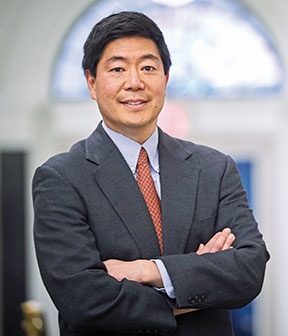Two articles co-authored by Stephen Choi among Corporate Practice Commentator’s top 10 for 2024
Two articles co-authored by Stephen Choi, Bernard Petrie Professor of Law and Business, are among the 10 best corporate and securities law articles of 2024, according to the annual survey of law professors conducted by Corporate Practice Commentator. To compile the top 10 list, teachers of corporate and securities law voted on a pool of more than 300 articles published last year.
Stephen Choi is co-director of the Pollack Center for Law & Business. Before joining the NYU Law faculty in 2005, Choi taught at the University of California, Berkeley, School of Law, where he was Roger J. Traynor Professor of Law. Prior to that, he taught as an assistant professor at the University of Chicago Law School from 1996 to 1998. He graduated first in his class from Harvard Law School in 1994—where he served as a legal methods instructor and supervising editor of the Harvard Law Review—and received his PhD in economics from Harvard in 1997. Choi has been a recipient of the Fay Diploma, the Sears Prize, and the Irving Oberman Memorial Award. He has also held John M. Olin, Jacob K. Javits, and Fulbright fellowships. After his graduation from law school, Choi worked as an associate at McKinsey & Company. His research interests focus on the theoretical and empirical analysis of corporations and capital markets. He has published in the Yale Law Journal, Stanford Law Review, University of Chicago Law Review, Michigan Law Review, Southern California Law Review, Duke Law Journal, and Virginia Law Review, among others, and has presented papers at numerous conferences and symposia. More than a dozen of Choi’s earlier articles have appeared on Corporate Practice Commentator’s top 10 list in previous years.
In “Contract Production in M&A Markets,” published in the University of Pennsylvania Law Review, Choi and co-authors Mitu Gulati, Matthew Jennejohn, and Robert Scott compare the use of boilerplate language and of bespoke provisions in mergers and acquisitions contracts. “We find evidence of an informal information network that transforms bespoke changes in contract terms into industry-wide standard provisions,” they write. “This organic coordination structure leads to both market-wide coordination as well as a diversity in this response as individual actors implement bespoke variations of the new standard.”
The article “Paying for Performance? Attorneys’ Fees in Fraud Class Actions” by Choi, Jessica Erickson, and A.C. Pritchard considers the question: how much do plaintiffs’ lawyers matter in securities class actions? Appearing in the Journal of Empirical Legal Studies, the paper analyzes results obtained by top-tier plaintiffs’ firms and those obtained by lower-tier plaintiffs’ firms. “We do find that top-tier lawyers obtain better outcomes for shareholders in a subset of securities class actions, specifically the cases against the larger (although not the very largest) companies,” the co-authors write. Otherwise, they find, the differences in results are negligible. “Although the top-tier firms do not get better results in most cases, they do invest more hours and money into their cases,” they add.
Over the 31 years that the Corporate Practice Commentator has been compiling its list of best corporate and securities articles, numerous NYU Law faculty members have been recognized, including Norma Z. Paige Professor of Law Jennifer Arlen ’86, Robert B. McKay Professor of Law Ryan Bubb, Catherine A. Rein Professor of Law Emiliano Catan LLM ’10, Moses H. Grossman Professor of Law Scott Hemphill, Nathalie P. Urry Professor of Law Robert Jackson Jr., George T. Lowy Professor of Law Marcel Kahan, Stuyvesant P. Comfort Professor of Law Geoffrey Miller, Professor of Law Michael Ohlrogge, Martin Lipton Professor of Law Edward Rock, and Professor of Law Emeritus Daniel Rubinfeld, in addition to Choi.
Posted May 14, 2025


